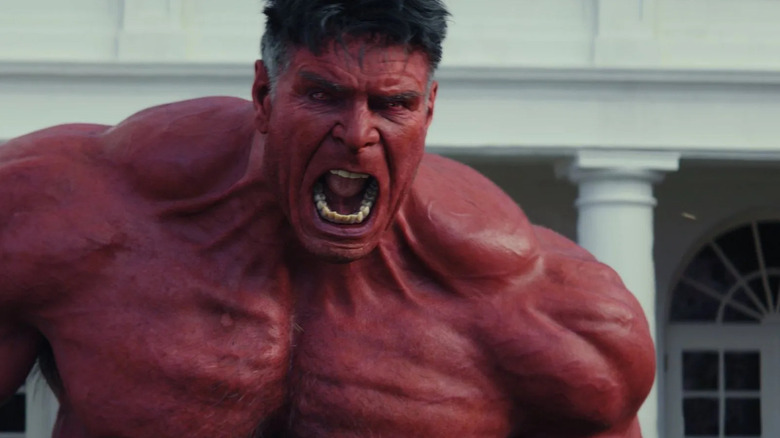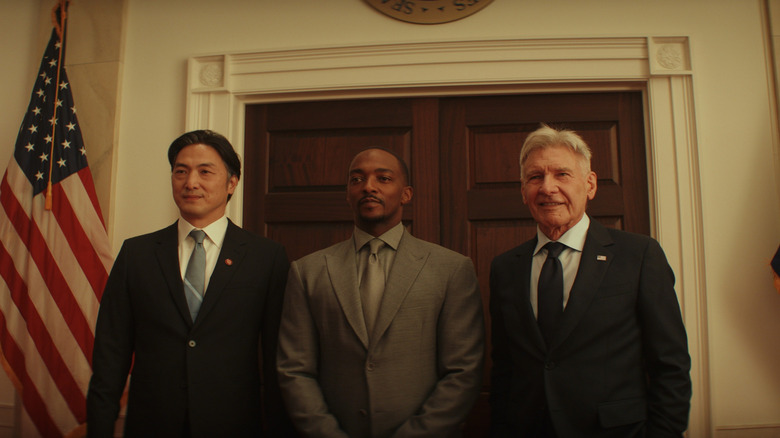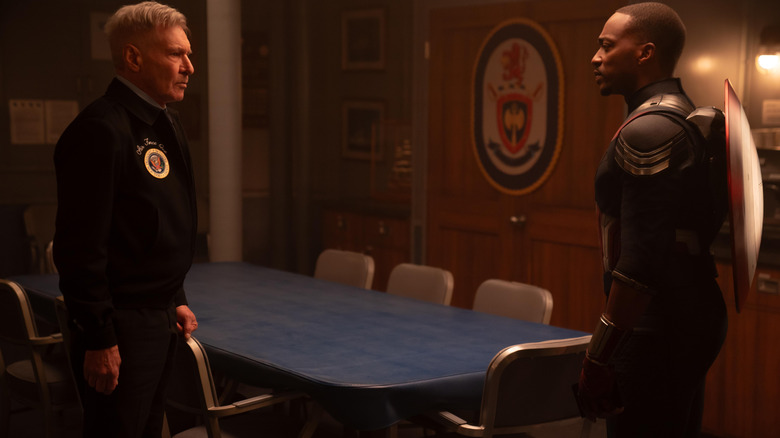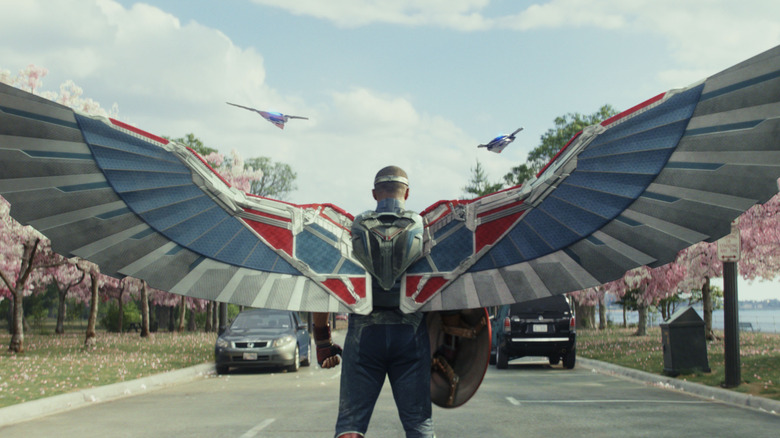Captain America: Brave New World Is A Direct Sequel To The Most Forgotten MCU Movie
Hulk smash ... spoilers, that is. Be warned: this article discusses major plot details from "Captain America: Brave New World."
The first movie starring a Black Captain America has finally released in theaters and all I got was this lousy "The Incredible Hulk" sequel? There's much to be said for how director Julius Onah's star-spangled blockbuster might have been doomed long before ever hitting the big screen, from interruptions related to the dual writer and actor strikes to unpredictable current events casting certain plot points in an unsettling light. My own review of "Captain America: Brave New World" for /Film mostly wrestled with the messy aftermath of it all, but it's finally time to dive deep into one specific creative decision. Between the reliance on Thaddeus Ross (Harrison Ford) as the main antagonist, the secret identity of the mysterious "buyer" responsible for the chaos in the shadows, and predicating the final emotional moment on a last-minute cameo by Liv Tyler's Betty Ross, the main narrative thrust of this movie has less to do with any actual "Captain America" iconography and more about dealing with leftover scraps from the most forgotten Marvel Cinematic Universe installment of them all.
If you think turning the fourth "Captain America" movie into a glorified "The Incredible Hulk" sequel feels like a baffling choice for Sam Wilson's (Anthony Mackie) big-screen debut as the franchise's new and improved Cap, you're far from alone. Of course, this was obvious to anyone who kept up with the marketing campaign and couldn't possibly miss all the Red Hulk mayhem plastered across every trailer. But the reveal that Tim Blake Nelson's Samuel Sterns, returning at long last for the first time since 2008, was actually the one carefully maneuvering each piece of the plot into place? That was one twist not even hinted at prior to the movie's release. Unfortunately, as gloriously comic-booky as it may be to see the super-smart villain known as The Leader in action, his reintroduction only makes the priorities of "Brave New World" feel all the more misplaced.
Why did Marvel turn a "Captain America" sequel into the cinematic equivalent of a high school reunion for the "The Incredible Hulk" cast? Did this approach help the actual movie? And where do we go from here? Put on your stretchy pants and take your daily dose of gamma radiation, because we're about to break it all down.
Eventually, you do plan to have Captain America in your Captain America movie, right?
Let's start with the most glaring casualty of "Brave New World." Once Chris Evans hung up the stars and stripes and sailed off into MCU retirement (well, only if you believe his denials that he's set to return in "Avengers: Doomsday"), it became obvious to pretty much everyone that Anthony Mackie would inherit the mantle of Captain America moving forward. The enjoyable "Falcon and the Winter Soldier" Disney+ series further explored the pressures and responsibility involved in this passing of the torch, painting a largely convincing picture of what it meant for a Black man to wear the colors of the American flag on his chest. Frustratingly, outside of maybe one or two quiet moments of doubt, practically none of that nuance and complexity is anywhere to be seen in the final film.
Although it's possible to imagine a scenario where a better screenplay managed to balance both Sam Wilson's personal arc and the fan-service obligations of "The Incredible Hulk," let's just call it as it is. Maybe "Brave New World" could've done better by Sam, his mentor figure and first Captain America Isaiah Bradley (Carl Lumbly), and the racial politics of it all (as laid out insightfully by Robert Daniels in his review for RobertEbert.com) if the rest of the story had actually been focused on characters and themes specific to, you know, Captain America. The MCU has never hesitated to remix and modernize various elements from the comic books during the arduous task of adapting the source material into live action ... but is that really an excuse? The first "Iron Man," the first "Thor," and the first "Captain America" movies (to name just a few) all dealt with villains rooted in those respective title characters. Yet Sam Wilson gets stuck battling Red Hulk and The Leader, two villains he has hardly any real connection with whatsoever? (Yes, I know the plot of the newest reissue of "Captain America" in the comics involves Sam versus the Red Hulk, but that's more about Marvel's obsession with #brandsynergy than anything else.)
We can only judge "Brave New World" by the narrative pieces we have in front of us, and all signs point to Captain America getting lost in the shuffle of a plot too preoccupied with a movie hardly anyone even liked at the time.
Captain America: Brave New World isn't even a great The Incredible Hulk sequel, either
So, for all that hand-wringing over the gamma-irradiated monster in the middle of the action, surely "Captain America: Brave New World" at least delivers on all its "The Incredible Hulk" sequel potential ... right? Well, we've got some more bad news for you. Don't get me wrong — despite being one of the worse characters in the comics, the Red Hulk of it all might actually be the best and most thrilling part of the entire movie. Even with the entire world knowing that Harrison Ford was eventually going to lose control and let the Red Hulk out at some point, director Julius Onah handles the slow-burning buildup as satisfyingly as he possibly could've. (It's certainly not his fault that the marketing spoiled the entire climax of the film months ahead of time.) But beyond the spectacle of it all, can anyone honestly claim that hijacking Sam Wilson's moment in the spotlight in order to tie up some loose ends involving Ross, his daughter Betty, and Samuel Sterns was worth it?
Making matters worse is the fact that, even with a premise as forced as this (anyone hoping for an explanation of how the unlikable general who tore the super-popular Avengers apart with his Sokovia Accords legislation in "Captain America: Civil War" somehow won a Presidential election will continue to be disappointed), "Brave New World" still could've worked as brainless entertainment, simply by doing what "The Incredible Hulk" couldn't. In 2008, Marvel was still figuring out how to make the Dr. Jekyll/Mister Hyde dynamic of Bruce Banner feel compelling in live action, and the early misstep just couldn't crack that tough nut. Now, after multiple Hulk-centric storylines, what justification does this have for failing to make the Red Hulk no more compelling than the mindless Abomination was? President Ross is a mere passenger in his transformation into Red Hulk, and any inner conflict he may feel mostly just gets hand-waved away because he's, like, really sad about his daughter Betty hating his guts (justifiably so, may I add).
This is merely the natural end result of building an entire feature around dangling subplots from a movie that — I can't emphasize enough — nobody except the most obsessive fans even remember.
How does Captain America: Brave New World set up Sam Wilson moving forward?
Where do we go from here? For those who came away extremely disillusioned by "Brave New World," there may yet be hope left for our new Captain America. The rather obligatory post-credits scene might be all about setting up the multiverse and the anticipated arrival of Doctor Doom down the line, but the movie itself at least puts Sam Wilson in position for a worthy role to come ... which, now that I typed that all out, does have the whiff of damning with faint praise.
Still, we'll take whatever Cap-sized scraps we can get at this point. One of the last scenes in the film features Sam paying a visit to the hospital to see his injured friend and Falcon-in-training, Joaquin Torres (Danny Ramirez), who was knocked out of the sky and into the ocean during the second act battle sequence set in the Indian Ocean. While President Ross' plan to rebuild the Avengers (yes, which was technically a spoiler for "Thunderbolts*") backfired before ever even getting off the ground, Sam realizes the wisdom behind it. Captain America might be a symbol for the rest of the world to aspire to, but nobody can do it alone. Thus, he announces his intentions to recruit Joaquin into his new version of the Avengers in a move that actually has some thematic heft to it — neither of them may be the world's mightiest super-soldiers, but they've proven to have the heart and guts it takes to be true heroes.
It may be too little and too late to redeem a mostly lackluster movie, but there's something to be said for having Sam's expanded role in the MCU to look forward to. Maybe next time around, he'll benefit from a script that actually does him justice. "Captain America: Brave New World" is now playing in theaters.



